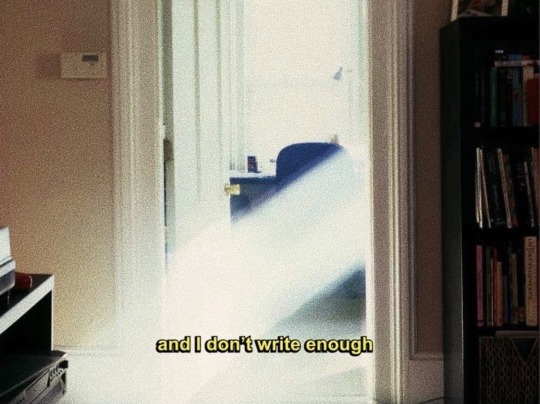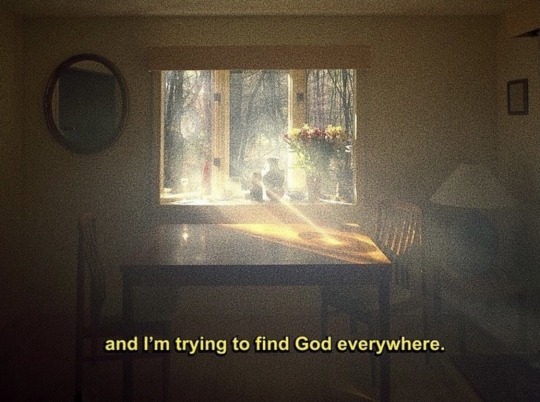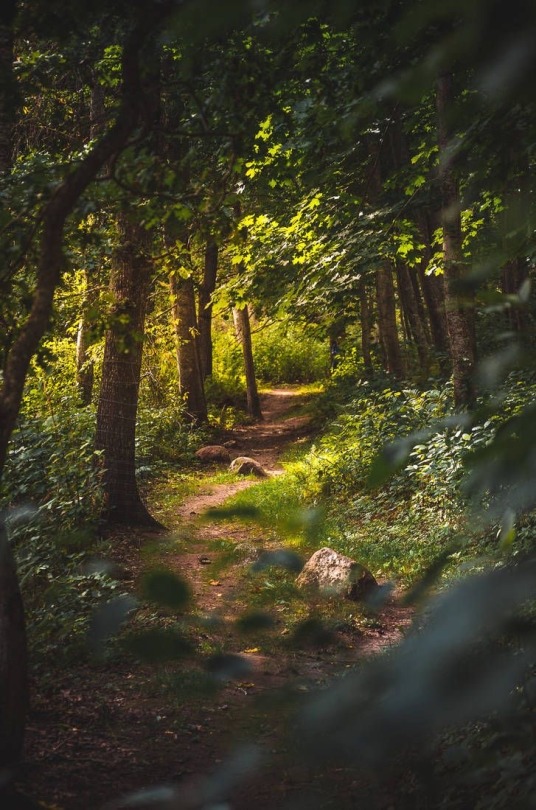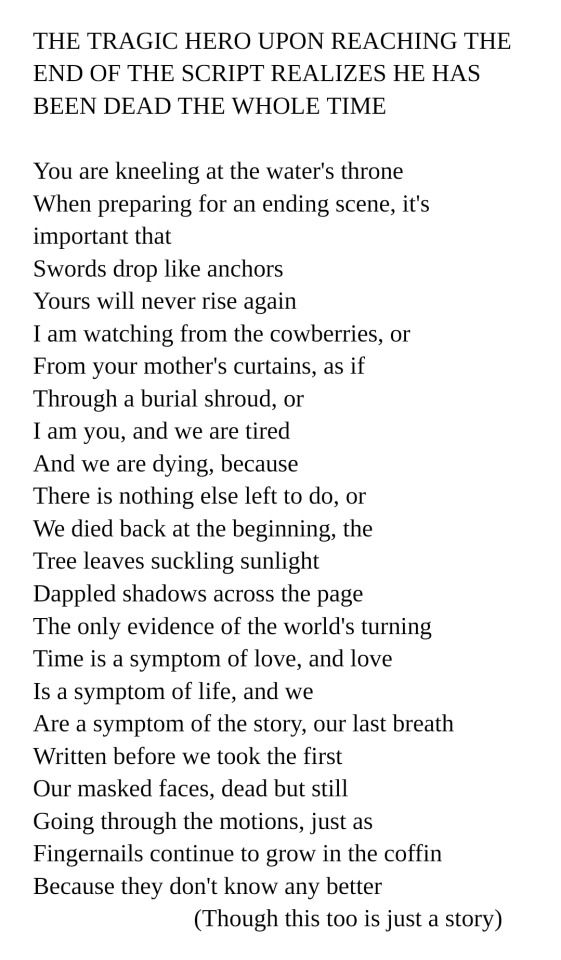Text
i think if hg wells was introduced to furries/therians he'd have several heart attacks in succession, each greater than the last by a few orders of magnitude
#hg wells#classic literature#island of doctor moreau#shitpost#the time machine#i love hg wells but i dont think he'd do very well in the modern day
0 notes
Text






i've got a god-shaped hole that's infected / and i'm petrified of being alone, now / it's pathetic, i know
(i, iii, v). anis mojgani, “for those who can still ride in an airplane for the first time” + photos: alexander harding, “visible light”
(ii). sylvia plath, “the unabridged journals of sylvia plath”
(iv). mayda del valle, “a faith like yours”
(vi). phoebe bridgers, “chinese satellite”
caption: the 1975, “if i believe you”
1K notes
·
View notes
Text








À moi. L'histoire d'une de mes folies.
~Donna Tartt, The Secret History
4K notes
·
View notes
Note
Do you have words related to gods such as Ichor and Ambrosia?
Words Related to Gods
Ambrosia - the food of the Greek and Roman gods; the ointment or perfume of the gods
Apotheosis - elevation to divine status; deification
Chthonic - of or relating to the underworld
Demiurge - in some early belief systems such as Platonic philosophy and Gnosticism, a god who creates, shapes, or controls the physical world
Divine healing - healing attributed to the direct agency of God usually in response to faith
Divine inspiration - inspiration that comes from God
Divine intervention - the action by God or a god of getting involved in a human situation in order to change it
Divine retribution - punishment by God
Divine right - the belief that someone can do whatever they want, as if allowed by God
Divine spark - a special and exciting feeling or quality inside us that some people believe is connected with a god
Ichor - an ethereal fluid taking the place of blood in the veins of the ancient Greek gods
Nectar - the drink of the Greek and Roman gods
Olympus - a mountain in Thessaly that in Greek mythology is the abode of the gods
Pantheon - all the gods in a particular belief system, considered as a group
The Supreme Being - a name for God
Sources: 1 2 ⚜ More: Writing References ⚜ Writing Resources PDFs
Words related to Mythology Part 1 ⚜ Part 2 ⚜ Part 3
Hope this helps with your writing!
235 notes
·
View notes
Text
Torturing your ocs ask game :)
(Delightful, I know. But we all do it sometimes)
1. Which of your ocs do you most often imagine sick? In what ways?
2. Which of them do you most imagine injured in other ways?
3. Who do you put through the most emotional turmoil?
4. Which oc has been tortured? Through what means?
5. Which of them has the worst luck?
6. Who goes through the most relationship conflicts? (applies to any relationships)
7. Who do you put most into stressful situations or other drama?
8. Who ends up in survival situations the most? How do they fair in them?
9. Has any of them had to be saved from the brink of death? Were there any consequences after?
10. Has any of them had to be revived / brought back to life? How did this affect them?
11. Who is afraid the most? How does this effect them?
12. What kind of health repercussions has your oc experienced through intense stress? How do they manage them?
13. Who cries the most often? What are the usual causes?
14. How does your oc cope?
15. To cap off what kind of hurt/comfort scenarios do you put your oc in?
This can be about canon story events or simply rotating scenarios for fun!
1K notes
·
View notes
Note
Hi!, ive encountered a problem i hope you would aid in? ive been trying to write this domestic breakfast scene where one character is still half-asleep trying to uphold a conversation but i can't. Its the "calm before the storm" kind of scene and i want to give my readers time to breathe and relate to the characters.
Writing Notes: Mundane Scenes
How Mundane Scenes can be Important (by editor Richelle Braswell):
Pacing: Mundane scenes can provide a breather from the action-packed scenes and add variation so that readers don’t get bored or worn down.
World-building: Mundane moments such as how characters get dressed in the morning or prepare their food can add realism and details to your world. It gives a sense of depth to characters lives and shows instead of tells how life operates.
Give weight to events: Mundane activities such as resting or tending to injuries can give weight to previous plot points such as a battle or reveal. We sit with the consequences, and thus the events feel like they have greater importance and space in the narrative.
Synthesize information: Characters can review things like whodunit clues or what they know so far over a meal or while traveling. Meanwhile, the reader can process events up until that point. These scenes are best used during the midpoint of a book or right before the climax.
Build tension: These much slower moments like chatting and weeding the garden can add tension to stories by sitting with the unknown. Readers will sense when things are too quiet and feel a building anticipation.
Develop character arcs: Slow moments such as shopping or washing-up can be important touchpoints to depict gradual character growth. If there is nonstop action, then there isn’t a chance for characters to stop and reflect and give the readers some insight into any changed thought processes and dilemmas.
Develop romance: Mundane moments are some of the best places to give characters space to make the bed together and fold laundry. Their romance and dynamic can be developed here but note that it is most effective when used sparingly and when the reader does not lose a sense of narrative drive.
Decisions as a challenge: Choices have gravity in a narrative when there is space for the main characters to struggle with doing the right thing. It can add further drama if they aren’t making tough decisions while dodging flying arrows or being chased, but while sweeping their floors or organizing their bookshelf. The reader experiences the weight of the choice since it can be carefully considered before it leads to a hero’s triumph or tragedy.
Whatever you do with a mundane scene, the idea to keep in mind is how it contributes to the whole.
some related literary tropes
"Slice of Life" Trope
Life, observed and examined.
A cast of characters go about their daily lives, making observations and being themselves.
There is an emphasis on the very moment, with the intent of focusing the audience on that moment rather than using that moment as part of a narrative.
"Calm before the Storm" Trope
Characterized by a sense of anticipation, perhaps tension, even dread of what is to come.
It allows the characters a moment of respite prior to everything going to hell.
Maybe they make final preparations.
Maybe they go bid farewell.
Maybe they go tie up loose ends or bury hatchets.
They might decide now's the time to finally spend the night with that special someone.
Or maybe they just meditate to still their minds and/or calm their nerves.
Or they may decide to throw a party while they still can.
This scene allows us a quiet moment to just be with the characters, especially if it winds up being the end of the line for some of them.
Great clouds lit from within by lightning gather on the horizon, an army can be seen assembling, or the Final Battle is just around the corner. Everyone knows it is inevitable.
Tomorrow the silence will be broken. Tomorrow there will be chaos. But for now, all is quiet.
"Action Film, Quiet Drama Scene" Trope
An action film trope that you can also incorporate in your writing.
In this kind of scene, there are no expensive visuals or frenetic action, just usually two characters talking about what they believe in, what they care about, their deepest pains, or anything that relates to the stakes of the situation.
This is not the same as the purely exposition scene in that there is something deeper displayed here.
In these scenes, you can understand the plot, grasp its theme, or develop a rapport with the characters to make the big scenes matter to your readers.
When it really works, it can make the action sequences all the more compelling, because the quiet scenes have allowed you to emotionally invest in the characters and care about their fate.
Examples
In The Hunger Games: Mockingjay – Part 2, after a long time fleeing through the giant death trap of the Capitol and suffering several losses, Cressida leads the squad to a friend's house. Their time in the basement covers a lot of ground, from mourning their losses to Katniss' guilt to the Love Triangle.
Inception: In the climax, we finally see whether or not Fischer reconciles with the memory of his father.
The Lord of the Rings: The scene between Aragorn and Arwen on the bridge in The Fellowship of the Ring. It introduces depth to Aragorn's character and reveals his backstory; the scenes of the Shire at peace in The Fellowship of the Ring (especially in the Directors Cut), filled with laughter, friendship and happy children (what a warrior lays down his life to protect) is what makes us actually care whether or not Frodo and the Fellowship defeat Sauron or not.
Sources: 1 2 3 4 ⚜ More: References ⚜ Writing Resources PDFs
Here are some information and related tropes to keep in mind as you write your scene. Use the tropes as inspiration, and alter as needed/desired to better fit your story. Reading how other authors have done this as well, especially in your favourite stories, is one way to know how you would execute it in your own story. You can find more details and examples in the links above. Hope this helps with your writing!
216 notes
·
View notes
Text
I AM FEELING GREAT!!! I WISH I HAD ITALICS SO I COULD EMPHASIZE THAT IM FEELING *GREAAAAAAAAAT*! WOOHOO YEAH I WANT TO UNHINGE MY JAW AND SWALLOW AN UNOPENED CAN OF RED BULL LIKE A SNAKE I FEEL AMAZING
0 notes
Text
my criteria for whether or not someone is my friend is whether or not they could identify my pancreas out of a lineup
1 note
·
View note
Note
hi can you do word for looking(EX: gazed, peered, glanced, etc)
Word List: Looking
Look - direct one's gaze toward someone or something or in a specified direction
Behold - to gaze upon
Cast about - to look around
Consider - to gaze on steadily or reflectively
Contemplate - to view or consider with continued attention
Coup d'oeil - a brief survey
Dart a glance/look at - to look suddenly and briefly at (something or someone)
Delve - to examine a subject in detail
Descry - to catch sight of
Discern - to detect with the eyes
Espy - to catch sight of
Examine - to inspect closely
Eye - look at; to watch or study closely
Gander - look, glance (e.g., take a gander)
Gape - to gaze stupidly or in open-mouthed surprise or wonder
Gawk - to gape or stare stupidly
Gaze - to fix the eyes in a steady intent look often with eagerness or studious attention
Glance - to take a quick look at something
Glare - to stare angrily or fiercely
Glimpse - to look briefly
Goggle - to stare with wide or protuberant eyes
Inspect - to view closely in critical appraisal; look over
Investigate - to observe or study by close examination and systematic inquiry
Leer - to cast a sidelong glance
Observe - to watch carefully especially with attention to details or behavior for the purpose of arriving at a judgment
Ogle - to look at especially with greedy or interested attention
Peek - to look furtively
Peep - to look cautiously or slyly
Peer - to look narrowly or curiously
Perceive - to become aware of through the senses, especially: see, observe
Peruse - to examine or consider with attention and in detail
Ponder - to consider especially quietly, soberly, and deeply
Pry - to look closely or inquisitively
Recce - reconnaissance (i.e., a preliminary survey to gain information)
Regard - to look attentively
Rubberneck - to look about or stare with exaggerated curiosity
Scan - to glance from point to point of often hastily, casually, or in search of a particular item
Scope - to look at especially for the purpose of evaluation —usually used with out
Scrutinize - to examine closely and minutely
See - to look about
Side-glance - a glance directed to the side
Sight - to look carefully in a particular direction
Spy - to observe or search for something; look
Squinny - squint
Squint - to look or peer with eyes partly closed
Stare - to look fixedly often with wide-open eyes
Study - to consider attentively or in detail
Survey - to view or consider comprehensively
View - to look at attentively
Watch - to look at
Witness - to have personal or direct cognizance of; see for oneself
Source ⚜ More: Word Lists ⚜ Writing Resources PDFs
Hi! Hope this helps with your writing. Also this list by @thewriteadviceforwriters is a great reference.
541 notes
·
View notes
Text
“Some people are born with tornados in their lives, but constellations in their eyes. Other people are born with stars at their feet, but their souls are lost at sea.”
— Perspectives, Nikita Gill
1K notes
·
View notes
Note
how do you write a liar?
How to Write Liars Believably
Language
The motive of every goal is the make the lie seem plausible while taking blame off the speaker, so liars will often project what they say to a third party: "Katie said that..."
Referring to third parties as "they" rather than he or she
In the case of a deliberate lie prepped beforehand, there will be an overuse of specific names (rather than pronouns) as the speaker tries to get the details right.
Overuse of non-committal words like "something may have happened"
Masking or obscuring facts like "to the best of my knowledge" and “it is extremely unlikely," etc.
Avoiding answers to specific, pressing questions
Voice
There's isn't a set tone/speed/style of speaking, but your character's speech patten will differ from his normal one.
People tend to speak faster when they're nervous and are not used to lying.
Body Language
Covering their mouth
Constantly touching their nose
fidgeting, squirming or breaking eye contact
turning away, blinking faster, or clutching a comfort object like a cushion as they speak
nostril flaring, rapid shallow breathing or slow deep breaths, lip biting, contracting, sitting on your hands, or drumming your fingers.
Highly-trained liars have mastered the art of compensation by freezing their bodies and looking at you straight in the eye.
Trained liars can also be experts in the art of looking relaxed. They sit back, put their feet up on the table and hands behind their head.
For deliberate lies, the character may even carefully control his body language, as though his is actually putting on a show
The Four Types of Liars
Deceitful: those who lie to others about facts
2. Delusional: those who lie to themselves about facts
3. Duplicitious: those who lie to others about their values
Lying about values can be even more corrosive to relationships than lying about facts.
4. Demoralized: those who lie to themselves about their values
Additional Notes
Genuine smiles or laughs are hard to fake
Exaggerations of words (that would normally not be emphasized) or exaggerated body language
Many savvy detectives ask suspects to tell the story in reverse or non-linear fashion to expose a lie. They often ask unexpected, or seemingly irrelevant questions to throw suspects off track.
7K notes
·
View notes
Text
Writing Reference: Medicinal Herbs

10 plants for your character's medicinal herb garden
PLANT — When to Plant — Conditions & Care — Medicinal Uses
ALOE VERA — spring/autumn — sunny site indoors; pot up as needed; do not overwater — fresh plant gel for minor burns and wounds
CALENDULA — spring/autumn — well-drained soil; full sun; remove dead flower heads — cream for cuts, scrapes, inflamed skin; infusion for fungal infections
COMFREY — spring/autumn — warm sunny site; moist soil — ointment or poultice for sprains and bruises (use the leaf only)
FEVERFEW — autumn/spring — well-drained or dry, stony soil in sun — fresh leaf or tincture for headaches and migraines
LEMON BALM — spring/autumn — moist soil in sun; cut back after flowering — infusion for anxiety, poor sleep, and nervous indigestion; lotion for cold sores
PEPPERMINT — spring/autumn — sunny but moist site; do not allow to dry out — infusion for indigestion and headaches; lotion for itchy skin
ROSEMARY — spring/autumn — sunny sheltered site; protect with burlap in winter — infusion as a stimulating nerve tonic and to aid weak digestion
SAGE — autumn/spring — well-drained or dry, sunny, sheltered site — infusion for sore throats, mouth ulcers, and diarrhea
ST. JOHN'S WORT — spring/autumn — well-drained to dry soil with sun or partial shade — tincture for depression and menopause; infused oil is antiseptic and heals wounds
THYME — spring/summer — well-drained soil, may need a layer of gravel; sunny site — infusion for coughs, colds, and chest infections; lotion for fungal infections
Source ⚜ More: Notes & References
6K notes
·
View notes
Text
Yay, unsolicited advice time! Or, not really advice, more like miscellaneous tips and tricks, because if there's one thing eight years of martial arts has equipped me to write, it's fight scenes.
.
Fun things to add to a fight scene (hand to hand edition)
It's not uncommon for two people to kick at the same time and smack their shins together, or for one person to block a kick with their shin. This is called a shin lock and it HURTS like a BITCH. You can be limping for the rest of the fight if you do it hard enough.
If your character is mean and short, they can block kicks with the tip of their elbow, which hurts the other guy a lot more and them a lot less
Headbutts are a quick way to give yourself a concussion
If a character has had many concussions, they will be easier to knock out. This is called glass jaw.
Bad places to get hit that aren't the groin: solar plexus, liver, back of the head, side of the thigh (a lot of leg kicks aim for this because if it connects, your opponent will be limping)
Give your character a fighting style. It helps establish their personality and physicality. Are they a grappler? Do they prefer kicks or fighting up close? How well trained are they?
Your scalp bleeds a lot and this can get in your eyes, blinding you
If you get hit in the nose, your eyes water
Adrenaline's a hell of a drug. Most of the time, you're not going to know how badly you've been hurt until after the fact
Even with good technique, it's really easy to break toes and fingers
Blocking hurts, dodging doesn't
.
Just thought these might be useful! If you want a more comprehensive guide or a weapons edition, feel free to ask. If you want, write how your characters fight in the comments!
Have a bitchin day <3
20K notes
·
View notes
Text
reblogging because i need to Remember
When writing emotionally reserved characters:
Show your character's struggles with holding in emotions. Just because your character won't let themself go in public, doesn't mean they don't struggle holding everything in.
Find a motive. Pride and/or consideration for those around them can make emotionally reserved people hold back more than would be considered good for them. There are other reasons too, perhaps the initial cause and the reason now are different, but try to give them a reason.
Show side-effects. Everything you bottled up shows itself in another way, whether it's physical or mental. This can be long- and short-term, depending on the severity of the emotions.
Give them coping mechanisms. Everyone who wishes not to show certain emotions has a trick or two to keep themselves in check. Taking a sip of water, not looking people in the eyes, clenching their fists, breathing just a bit too deeply.
Write subconscious signs that they give off, which close friends or family might pick on. Just because these characters want to keep their emotions to themselves, doesn't mean they don't give off signs. Some manage to keep said signs well hidden from those closest to them, but it's more common for environment to pick up on something at the very least.
7K notes
·
View notes
Text
Touches Ask Game
Prompts for writing human connection, intimacy, belonging.
Hand-holding
The purest form of human connection.
tiny hands in big hands
calloused hands in soft hands
cold hands in warm hands
hands with the perfect ratio to each other for hand-holding
platonic hand-holding
running their thumb over the other’s hand
dancing with their hands holding onto each other
squeezing hand for comfort and encouragement
holding hands across the table
happily doing everything with just one hand, if it means they don’t have to let go
not wanting to lose each other in a big crowd
possessive hand-holding
linking hands together during sex
grabbing hand to show them something
loosely holding onto each other’s hands, laying in one’s lap
only linking the pinkies together, not ready to let go completely
holding hands while skating
excitedly grabbing each other’s hands during a concert, jumping up and down together
playing with each other’s fingers
pressing the other’s hand against their cheek
holding hands while one is balancing on a small wall
grabbing the other’s hand to pull them back from something
holding hands under the table
only realizing it when they have to let go
standing in front of each other, holding both their hands
holding their hands above their head, fingers linked together
passionate hand-holding
grabbing the other’s hand so they don’t fall
holding hands while running through the rain
brushing against each other, linking fingers together for a second
grabbing their hand to grab their attention
not really paying attention, both doing something else, but still holding hands
bandaging the other’s hand and not quite letting go
holding hands while driving
grabbing the other’s hand to pull them back to them
unconsciously searching out each other’s hand while sleeping
not realizing they’re holding hands till someone points it out
swinging hands back and forth, skipping like children
holding hands in a museum to pull them to the next exhibition
letting go when there is an obstacle in their way and immediately grabbing each other’s hand again when they pass it
loosely holding onto each other’s hand
dragging the other with them, holding their hand
raising the other’s hand to their lips to kiss it softly
holding hands while jumping down from somewhere together
comparing hand sizes, then linking fingers together
secretly holding hands under the table
holding onto the other’s hand so they can’t run away
making a heart with their hands and then linking them together
taking the other’s hand to look for injuries
holding hands to calm each other down
Hugs
A warm embrace.
friendly hugs
hug around the waist
hugging while twirling around
comforting hugs
side hugs
hugging and gently holding the other’s head
pulling someone into a hug
hugging while walking
eye-to-eye hugs
hiding their face in the other’s neck
clinging to each other
hugging while lying down together
group hugs
hugging with head on shoulder
tender embrace
‘not wanting to let go’ hugs
hugging from behind
bear hugs
hugging with hands in each other’s pockets
cuddling
hugs and kisses
hugging and jumping up and down together
familiar hugs
hugging with height-difference
gentle hugs
hugging with patting on back
piggy back hugs
quick hugs
hugging while slow dancing
one-sided hugs
hugging while straddling the partner
long-lasting hugs
‘picking them up’ hugs
hugging while grabbing butt
cuddle pile
Kisses
Showing affections.
goodnight kisses
hand kisses
smiling while kissing
lips barely touching
morning kisses
slow kisses
passionate kisses
kisses on the cheek
first kisses
goodbye kisses
welcome home kisses
kisses on the corner of their mouth
frustrated kisses
kissing each other breathless
soothing kisses
nose kisses
kisses as a promise
short pecks
forehead kisses
French kisses
tearful kisses
kisses on head
calming kisses
“we’ll face this together” kisses
kisses in the rain
life-or-death kisses
kisses for a cover
hard kisses
giggling while kissing
desperate kisses
neck kisses
“stay strong” kisses
hushed conversation in-between kisses
eyelid kisses
gentle stroking of cheeks while kissing
small kisses
kissing it better
fake kisses
jaw kisses
wake-up kisses
thigh kisses
kissing away tears
“we’ll get through this” kisses
public kisses
relieved kisses
kisses for comfort
tummy kisses
kisses to shut them up
slowly kissing down the body
“we’ll see each other again” kisses
kissing each finger
quick kisses
reassuring kisses
sleepy kisses
feather-light kisses
angry kisses
kisses with trembling lips
“forever mine” kisses
secret kisses
kisses with their last dying breath
Touching
Feeling another human’s touch.
touching foreheads
running fingers through hair
hiding face in neck
caressing the other’s hand
feeling their pulse
patting the other’s head
holding hands
shielding the other one with their body
listening to the other’s heartbeat
spooning at night
laying their hand on the other’s neck
pushing a strand of hair behind their ear
nudging the other one
putting an arm around the other’s waist
hugging each other
massaging them
holding the other’s chin up
squishing the other’s cheek
high fiving
bandaging/stitching up an injury
kissing the other’s brow
falling asleep on the other’s shoulder
carrying the other one in their arms
whispering in their ear, lips touching the skin
stroking the other’s arm soothingly
kissing the top of their head
pulling the other one towards them
feeling for each other in the dark
tickling the other one
grabbing onto their arm
doing a pinky swear
caressing the other’s back
tasting their smile
washing the other’s body
kissing their bruises and scars
lifting the other one up
putting their head on the other’s chest
stroking their leg
leaning into the other’s side
patting them on the back
sitting close and knees touching
braiding the other’s hair
giving them a piggy-back ride
sitting on the other’s lap
feeling their temperature
linking arms with each other
touching their elbow to get their attention
dancing with each other
holding onto the other’s shoulders for support
putting a hand over the other’s mouth to shut them up
caressing the other’s cheek
gripping thigh
holding the other’s jaw
touching cheek to cheek
tracing the lines on the other’s hand
Hand-holding|Hugs|Kisses|Touching
If you like my blog and want to support me, you can buy me a coffee or become a member! And check out my Instagram! 🥰
25K notes
·
View notes
